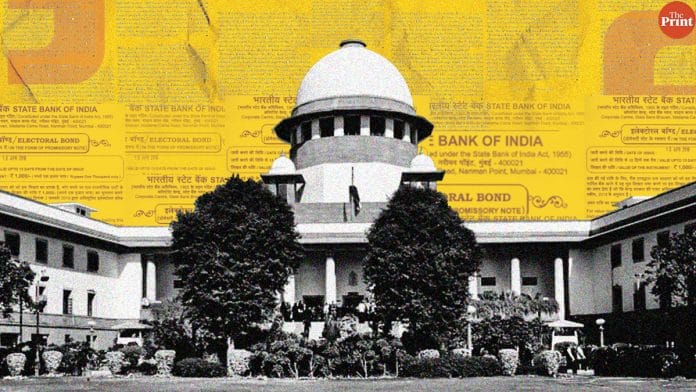The Supreme Court has refused to put a stay on electoral bonds and asked the political parties to submit details of funds received through bonds in a sealed cover to the Election Commission by 30 May.
ThePrint asks: SC electoral bonds order: Some transparency or conveniently postponing the controversy?
In democracy, a citizen has every right to know the source of political funding for parties
 Maj. Gen. Anil Verma (Retd.)
Maj. Gen. Anil Verma (Retd.)
National Head, Association for Democratic Reforms
We are disappointed with the Supreme Court order. Not only ADR, even the Election Commission in its affidavit has said that it is not sure where this money is coming from. Is it a case of black money being turned white or is it a case of foreign funding? These apprehensions have been clearly mentioned in the affidavit.
The logic given by the Attorney General that the voters do not have a right to know the source of funding for a political party is quite ludicrous.
In a democracy, the citizen has every right to know where political parties get their funding from. If a party is getting money from foreign sources, it is a cause of concern in a democracy.
That donors can be targeted if their identities are made public is really not a good enough reason to not make funding transparent.
The Supreme Court has directed all political parties to present all the details on donations they have received through electoral bonds in a sealed cover to the Election Commission by 30 May. But this means that the issuing of electoral bonds will go unchecked in the 2019 Lok Sabha elections.
Even if the information regarding donations is given to the EC, what can it do with it? Is the EC in a position to scrutinise and analyse what kind of companies are giving these funds? I don’t understand the rationale behind this.
If there is no change in the electoral bond system, one will get to know about the funding received by political parties only by the end of 2019, when the parties submit their reports.
Also read: Electoral bonds help BJP coerce donors & that’s why Arun Jaitley rises to their defence
Electoral bonds ensure far more transparency than previous methods of political funding
 Ishkaran Bhandari
Ishkaran Bhandari
Advocate
The Supreme Court order shows that electoral bonds are a perfectly acceptable and legitimate form of party funding. For the upcoming elections, the only caveat is that the court has asked all political parties to submit details of the donations in a sealed cover by 30 May. After that, the Supreme Court may take a call on how the process can be made more transparent. But for the 2019 Lok Sabha elections, the electoral bond scheme will continue.
I believe this is a very good order. Everywhere in the world, parties do need funding for electoral purposes. Moreover, it isn’t like the Congress or any other political party besides the BJP can’t get these funds through electoral bonds. So, it is a level-playing field for all parties.
Earlier, people were giving truck full of cash to political parties of their liking. That was a completely un-democratic and non-transparent means of funding. At least, in the case of electoral bonds, because the funds are being funnelled through banks, everything is recorded. Since the bank would follow all the procedures, this method ensures far more transparency than the previous methods of political funding.
The transactions will now be submitted to the Election Commission in a sealed cover, and the Supreme Court can later put more norms and guidelines in place, if it wishes to.
Also read: Congress manifesto promises to scrap electoral bonds, amend anti-defection laws
By the time parties file donor details as per SC deadline of 30 May, damage would be done
 Commodore Lokesh Batra
Commodore Lokesh Batra
RTI Activist
In less than 24 hours, the Modi government seems to have forgotten the Supreme Court order on Rafale documents, in which the RTI Act was quoted extensively by the judges.
In the hearing on electoral bonds, the Modi government failed to explain under which clause of the RTI Act can citizens be denied information on the donors making anonymous donations to political parties. The anonymity allows the possibility wherein corporates will donate funds to political parties without even their companies’ employees or share-holders being aware of it.
The government is clearly showing signs of opacity. The Supreme Court has asked political parties to file donation details in a sealed cover to the Election Commission by 30 May. But the Lok Sabha elections will be over by then, the damage would be done.
With due respect to the Supreme Court, it would have been better if it had asked the political parties to give details of all past donations and purchases of electoral bonds to the Election Commission, and asked them to continue doing so in the future as well.
I have filed several RTI applications with respect to electoral bonds, and other issues of electoral funding, but to no avail. My applications have been tossed around from one department to another — only proving that the Modi government is not interested in transparency, and is merely misleading the public.
The ECI, in a letter to the Modi government in May 2017, had flagged concerns about transparency. Unless these concerns are addressed, such government measures will continue to impact the conduct of free and fair elections.
Also read: SC order on electoral bonds: Willing to wound, but afraid to strike
Electoral bond order begs the question: Who is a bigger threat to transparency — SC or govt?
 Apurva Vishwanath
Apurva Vishwanath
Legal commentator
The Supreme Court’s interim decision on electoral bonds follows a pattern that shows how the court has allowed silent wins to the Modi government by simply delaying decisions. The electoral bonds issue is essentially another fait accompli scenario, at least for this election like the Aadhaar and demonetisation.
The interim order directs political parties to disclose details of donors for donations received through electoral bonds to the Election Commission.
Now, this seems a logical first step. However, two aspects show why this is disappointing. The timing of the intervention – just when the election is about to begin – shows the court is fully aware of its significance, yet deliberately chose to delay the proceedings. While the notice, in this case, was issued over a year ago, the court finally heard the matter this week and has hastily passed only interim directions.
Second, and perhaps the most damaging, is the secrecy of the information sought. Despite wide criticism, CJI Ranjan Gogoi continued efforts to contain vital information in sealed covers is a threat to democracy. It is not surprising that the sealed envelope cases are all in controversial issues questioning the government like the National Register of Citizens, Rafale deal, etc.
The delay and the nature of this interim order throw up a question even more significant than the validity of electoral bonds: Who poses a bigger threat to transparency: the Supreme Court or the government?
Also read: Supreme Court bats for transparency but seeks information in sealed envelopes
Supreme Court is promoting a limited and privileged right to information
 Sanya Dhingra
Sanya Dhingra
Principal Correspondent, ThePrint
There is little to celebrate in the Supreme Court’s neither-here-nor-there interim judgment on electoral bonds. In its attempt to ensure transparency, the Supreme Court is promoting a convenient, even dangerous, conception of transparency that conceals more than it reveals.
The court – concerned about the opacity of the electoral bond scheme – has asked political parties to submit the details of donors and the amounts received from them to the Election Commission in a sealed envelope. The irony is hard to miss.
Why must the Supreme Court’s definition of transparency stop at the Election Commission? Just yesterday, Justice Deepak Gupta said that it is important for the voter to know who funds their party in a democracy. So, why would the SC not extend this right to information to the voter?
If the disclosures ordered by the SC are never made public, it defeats the purpose of the petition. Crucial questions like who funds the country’s national parties, where do the donors’ funds come from – will remain unanswered.
If on the other hand, the information is eventually made public, as it should be, it would be for the SC to wonder what it achieved by further promoting this privileged right to information for a few in sealed envelopes.
Last year, the CJI had lashed out at the petitioners while hearing the CBI feud case about the alleged leak of confidential information submitted to the court in a sealed cover. In a country with a free press, leaks are inevitable. The only antidote to leaks is to reduce opacity in matters of public interest.
By Fatima Khan, journalist at ThePrint.







I am ashamed of the Attorney General. How can anybody with common sense argue that it is not the business of the voter to know the source of funding of the political party that seeks his vote? Ludicrous!
Ideally, this case ought to have been disposed of before the general election process started. However, given its importance, may the apex court be now pleased to rule definitively on the issue of electoral bonds. Let at least the tip of the iceberg of electoral funding be pristine.
The ECI has become redundant recently if we see the way they are perceived to be favouring the present government. So the SC has done little for transparency when it comes to political funding. We have witnessed what the “sealed cover” has done for Rafale as Apurva mentioned. It seems SC one day advocates for freedom of speech by considering “stolen files” and restricting it the next day. I would very much prefer Communist party’s not getting corporate funding than this opacity of the BJP, INC or any other political parties even though I don’t believe in their economic ideology